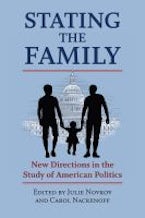
Stating the Family
New Directions in the Study of American Politics
Published by: University Press of Kansas
Imprint: University Press of Kansas
288 Pages, 152.00 × 228.00 × 22.00 mm

Published by: University Press of Kansas
Imprint: University Press of Kansas
288 Pages, 152.00 × 228.00 × 22.00 mm